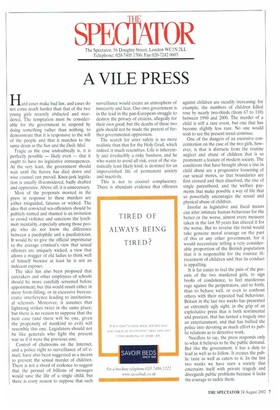A VILE PRESS
Hard cases make bad law, and cases do not come much harder than that of the two young girls recently abducted and murdered. The temptation must be considerable for the government to respond by doing something rather than nothing, to demonstrate that it is responsive to the will of the people and that it marches to the same drum as the Sun and the Daily Mail.
Tragic as the case undoubtedly is, it is perfectly possible — likely even — that it ought to have no legislative consequences. At the very least, the government should wait until the furore has died down and wise counsel can prevail. Knee-jerk legislation is usually ill-considered, badly drafted and oppressive. Above all, it is unnecessary.
Most of the proposals mooted in the press in response to these murders are either misguided, fatuous or wicked. The idea that convicted sex-offenders should be publicly named and shamed is an invitation to crowd violence and sanctions the lynchmob mentality, especially among those people who do not know the difference between a paedophile and a paediatrician. It would be to give the official imprimatur to the average criminal's view that sexual offences are uniquely wicked, a view that allows a mugger of old ladies to think well of himself because at least he is not an indecent exposer.
The idea has also been proposed that caretakers and other employees of schools should be more carefully screened before appointment; but this would result either in mere form-filling, or in excessive bureaucratic interference leading to institutional sclerosis. Moreover, it assumes that lightning strikes twice in the same place; but there is no reason to suppose that the next case (and there will be one, given the propensity of mankind to evil) will resemble this one. Legislators should not be like generals who fight the present war as if it were the previous one.
Control of chatrooms on the Internet, and a police right to surveillance of all email, have also been suggested as a means to prevent the sexual murder of children. There is not a shred of evidence to suggest that the perusal of billions of messages would save the life of a single child, but there is every reason to suppose that such surveillance would create an atmosphere of insecurity and fear. Our own government is in the lead in the pan-European struggle to destroy the privacy of citizens, allegedly for their own good; but the deaths of these two girls should not be made the pretext of further governmental oppression.
The search for utter safety is no more realistic than that for the Holy Grail, which indeed it much resembles. Life is inherently and irreducibly a risky business, and he who wants to avoid all risk, even of the statistically least likely kind, is destined for an impoverished life of permanent anxiety and inactivity.
This is not to counsel complacency. There is abundant evidence that offences against children are steadily increasing: for example, the numbers of children killed rose by nearly two-thirds (from 67 to 110) between 1990 and 2000. The murder of a child is still a rare event, but one that has become slightly less rare. No one would wish to see the present trend continue.
One of the dangers of an excessive concentration on the case of the two girls, however, is that it distracts from the routine neglect and abuse of children that is so prominent a feature of modern society. The conditions that have brought about a rise in child abuse are a progressive loosening of our sexual mores, so that boundaries are first crossed and then dissolved, the rise of single parenthood, and the welfare payments that make possible a way of life that so powerfully encourages the sexual and physical abuse of children.
Insofar as legislative and fiscal means can alter intimate human behaviour for the better or the worse, almost every measure taken in the last 50 years has altered it for the worse. But to reverse the trend would take genuine moral courage on the part of this or any other government, for it would necessitate telling a very considerable proportion of the British population that it is responsible for the routine illtreatment of children and that its conduct is appalling.
It is far easier to feel the pain of the parents of the two murdered girls, to sign books of condolence, to feel murderous rage against the perpetrators, and so forth, than to behave well, or even to confront others with their repeated bad behaviour. Britain in the last two weeks has presented an extremely ugly sight, in the grip of an exploitative press that is both sentimental and prurient, that has turned a tragedy into an entertainment, and that has bullied the police into devoting as much effort to public relations as to detective work.
Needless to say, the press responds only to what it believes to be the public demand. But like the government, it has a duty to lead as well as to follow. It creates the public taste as well as caters to it. In the last two weeks we have seen a society that entertains itself with private tragedy and disregards public problems because it lacks the courage to tackle them.






























































 Previous page
Previous page